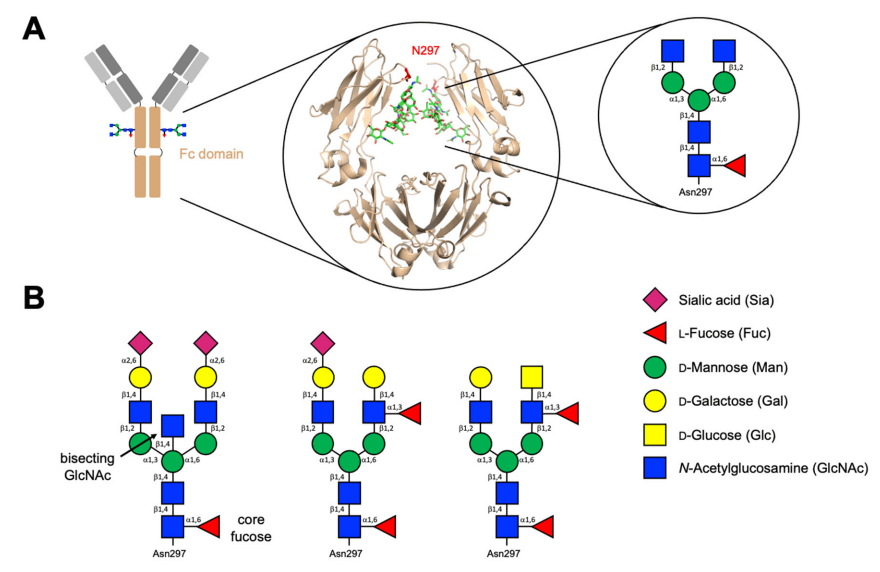Anti-Glycan Antibody Applications
Carbohydrates are one of the major classes of biomolecules found in living organisms. They play a critical role in numerous biological processes such as cell-cell adhesion, protein folding, protein trafficking, and cell signaling. Due to the fact that carbohydrates are extremely difficult to study, it is necessary to develop well-characterized anti-glycan antibody reagents that can be used to locate and monitor the expression of carbohydrates, define their biological roles, and to detect glycoantigens. Besides, anti-glycan antibodies play critical roles in human health and provide a rich reservoir of potential biomarkers for many biomedical applications and diseases. Here, Creative Biolabs gives an introduction to the basic and clinical applications of anti-glycan antibodies.
Introduction to Anti-Glycan Antibodies
Anti-glycan antibodies are antibodies that have been generated against specific glycan determinants. Generally, they can be produced with approaches such as hybridoma technology and phage display library screening. Firstly, whole cells, glycan-protein conjugates, or specific parasites and bacteria can be used to immunize mice to generate specific monoclonal antibodies using hybridoma technology. Secondly, phage display library can be screened with immobilized target antigens in enzyme-linked immunoabsorbent assay (ELISA) or glycan microarray assays.
 Fig.1 Cartoon representation and 3D structure of the Fc domain of a typical IgG and its Fc N-glycan.1, 2
Fig.1 Cartoon representation and 3D structure of the Fc domain of a typical IgG and its Fc N-glycan.1, 2
Basic Research
Antibodies to carbohydrates are essential for a variety of basic research purposes:
- Glycan Identification - Antibodies to specific glycan determinants can be used to identify the glycans/glycoconjugates.
- Glycan Purification - Antibodies are used to isolate glycoconjugates expressing specific glycan determinants using approaches such as affinity chromatography or affinity binding and immunoprecipitation.
- Characterizing Cell-surface Glycoconjugates - Antibodies are used to characterize cell-surface glycoconjugates using approaches such as immunohistochemistry, flow cytometry with cell sorting, and cell agglutination.
- Generating Animal Cell Glycosylation Mutants - Antibodies can be used to select cell lines that express altered cell-surface glycans.
- Cloning Glycosyltransferase Genes by Expression - Glycan-specific antibodies are useful in cloning genes encoding glycosyltransferases or other proteins required for proper glycosylation.
- Assaying Glycosyltransferases and Glycosidases - Antibodies to glycan antigens are useful in assaying specific glycosyltransferases and glycosidases in various formats.
- Modulating Biological Processes Mediated by Glycans - Anti-glycan antibodies are useful for modulating biological processes mediated by glycans, as agonists/antagonists.
- Detection and Discovery of Glycoantigens - Anti-glycan antibodies are useful for discovering carbohydrates relevant to disease states.
Clinical Applications
Aberrant protein glycosylation is a common phenomenon in different diseases, leading to the discovery of anti-glycan antibody biomarkers for diagnosis and prognosis. For instance, antibodies that target Sialyl Lewis A (CA19.9) are currently used in the detection and monitoring of different cancers. Moreover, detection of anti-glycan antibodies against blood group A and B antigens provides a simple and reliable strategy to predict which individuals are suitable matches for transfusions and transplants.
Aberrant forms of glycans have been identified as an entirely novel class of tumor-associated antigens (TAAs) suitable for specific tumor targeting. For example, the anti-GD2 antibody ch14.18 has been approved for the treatment of neuroblastoma. Other antibodies to GD3, GM2, fucosyl-GM1, STn, and Lewis Y have been developed for the aim of treating cancers.
To promote the development and availability of anti-glycan antibodies, Creative Biolabs proudly offers a comprehensive portfolio of Anti-Glycan Antibody Services to our clients globally. If you are interested in our services, contact us to discuss your requirements.
References:
- Li, Shasha, et al. "Glycoengineering of therapeutic antibodies with small molecule inhibitors." Antibodies 10.4 (2021): 44.
- Distributed under Open Access license CC BY 4.0, without modification.
- Glycan Identification
- Glycan Purification
- Cell-Surface Glycoconjugate Characterization
- Animal Cell Glycosylation Mutant Generation
- Expression Cloning Glycosyltransferase Gene
- Glycosyltransferase & Glycosidase Evaluation
- Glycan related Biological Process Modulation
- Glycoantigen Detection & Discovery
- Diagnostic Application
- Therapeutic Application
